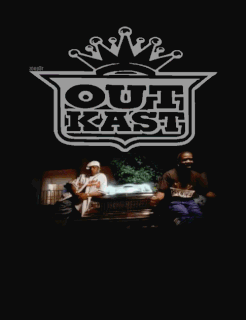

So it was like a rewiring of my already anxious teenage brain before high school, but it was definitely you know, a rewiring because that was the very real reality for me, is that, “Oh okay, so the South is definitely not what’s going on up north,” and hip hop was my introduction to what that could be like. So it was the Dungeon Family, it was Lil Jon and the East Side Boyz, and I’m like, okay. And being in southwest Georgia, whatever is hot in Atlanta is definitely going to be hot in Albany.

I was like, these are people that I need to know. Like we’re not having that conversation.” And I was like, “What? Why?” So then after that, I was always very attentive to the radio station in Albany, whatever was playing on the radio, I was trying to throw it into conversations. So I tried to jump into these conversations about rap that folks were having in the cafeteria and at school, and I remember one time I just kind of randomly threw out a Northeastern rapper, I forgot who it was by now, I mean, but they were like, “What, no, we’re not… go away. So Northern Virginia radio was pretty much whatever was playing in New York was playing in DC. But when I moved to Albany, I was in eighth grade, and I had moved from Northern Virginia. Bradley: The first time I was introduced to Outkast was the episode of Martin that was the player’s ball. Can you describe what it was like when you kind of first heard Southern rappers like Outkast, and UGK, Goodie Mob? Do you remember the first time?ĭr. You moved to Albany, Georgia, when you were 14. And I thought we would maybe start at the very beginning. It’s about the rise of the hip hop South. John Hammontree: You have a new book out called Chronicling Stankonia.
Outkast stankonia wiki full#
Bradley is the author of “Chronicling Stankonia: The Rise of the Hip-Hop South”īelow is a full transcript of the episode. Sign up for the Reckon Interview on Apple Podcasts, Spotify, Stitcher, or wherever you get your podcasts so you don’t miss out on future episodes.ĭr. We’re going to be focusing on those Southern stories, and how those stories shaped the South. What can our region’s great artists, thinkers, and leaders tell us about the South? And how can they help us write our own narratives? Because André didn’t say Outkast got something to say, or Atlanta got something to say. This is also a theme that we’re going to be examining throughout this season of the Reckon Interview. And in addition to the unique sound created by sampling Southern blues, soul, and funk, this was a unique perspective for hip hop at that moment. Bradley makes a convincing case that the South’s hip hop generation used their music to respond, remix and reinterpret their parents’ and their grandparents’ civil rights struggles, as well as the whole of Southern history. Bradley who has a stunning new book, “ Chronicling Stankonia: The Rise of the Hip-Hop South.”ĭr. This week on the Reckon Interview, we are talking about the hip-hop South. But once upon a time, André’s words were a battle cry. And 26 years after that moment, the sounds that have emerged from the South have taken over everything in hip hop.

As we know, every form of American music has Southern roots. Today, it may feel a little ridiculous that the South was ever sidelined in hip hop. And in a moment that spawned 1000 t-shirts, André Benjamin stared them down and said, “the South got something to say. And in an East Coast and West Coast world, hip hop awards just weren’t supposed to go to albums like Southernplayalisticadillacmuzik. The Source Awards had just recognized Outkast as the Best New Rap Group. In 1995, André Benjamin and Antwan “Big Boi” Patton took the stage in front of a hostile New York crowd.


 0 kommentar(er)
0 kommentar(er)
